Donald Trump listed seven ways the world can be changed
President Trump: Seven ways the world could change
- 76
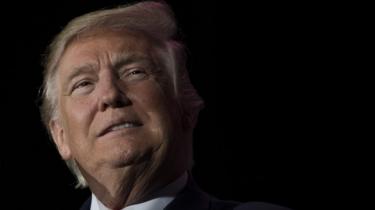 AFP
AFP
With Donald Trump in the White House, America's relationship with the rest of the world is on the verge of changing in some important ways. Here are seven of them.
Nato faces a shake-up
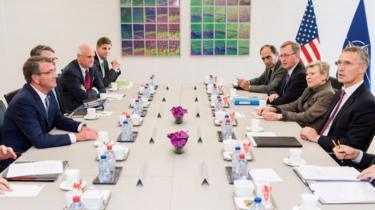 EPA
EPA
Mr Trump has been hugely critical of Nato (the North Atlantic Treaty Organization), a cornerstone of American foreign policy for more than 60 years.
He has attacked the organisation as obsolete and characterised its members as ungrateful allies who benefit from US largesse.
In one sense, Mr Trump's rhetoric simply gives voice to longstanding US concerns about most Nato members not meeting their goal of spending at least 2% of GDP on defence, while US defence spending is the largest in the world.
More recently, US Defence Secretary James Mattis travelled to Nato headquarters in Brussels to deliver his boss's warning.
Mr Mattis told Nato members Washington would "moderate its commitment" to the alliance if they do not take steps to increase their defence spending.
Only five (US, UK, Estonia, Greece and Poland) of the 27 member countries meet the spending requirement.
But Mr Mattis had also hailed Nato as a "fundamental bedrock" of trans-Atlantic co-operation, allaying European concerns about Mr Trump's previous comments about the alliance.
New cosier ties with Russia?
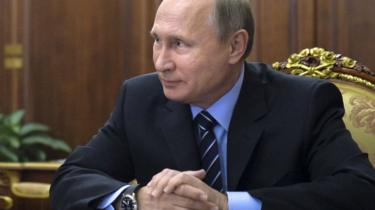 AP
AP
During the US election campaign, Mr Trump praised Russian President Vladimir Putin as a strong leader, with whom he would love to have a good relationship.
That was before US intelligence agencies determined Russia was responsible for hacking Democratic Party emails during the campaign - a conclusion that Mr Trump eventually conceded he agreed with.
The explosive publication of an unverified dossier alleging that Russia holds compromising material on Mr Trump has also raised prickly questions for him.
He has batted them away, dismissing the allegations as "fake news" and questioning if the dossier was purposely released by intelligence operatives.
Now Mr Trump says he will start off trusting Mr Putin (and German Chancellor Angela Merkel) but warns "it may not last long at all".
But Mr Trump's alleged ties to Russia have continued to overshadow his presidency.
Mr Trump's national security adviser Michael Flynn abruptly resigned after misleading Vice-President Mike Pence over whether he discussed sanctions with Russia's ambassador in the weeks before inauguration - which would violate a law that prohibits private citizens from conducting diplomacy.
US-Russia relations became significantly strained during the Obama administration over Ukraine, Syria and cyber-hacking. This appears to be a bilateral relationship where the dynamics could change significantly under President Trump.
An end to free trade?
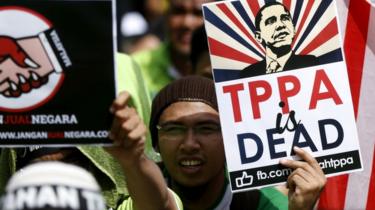 REUTERS
REUTERS
Donald Trump's trade policies would amount to the single biggest change to the way America does business with the rest of the world in decades.
He has threatened to scrap a number of existing free trade agreements, including the North American Free Trade Agreement between the US, Canada and Mexico, which he blames for job losses. He has even suggested withdrawing the US from the World Trade Organization.
Since winning the election, he has focused on threatening companies, particularly automobile makers, that he will slap a tariff of 35% on goods manufactured in Mexico.
On his first day in office, Mr Trump abandoned the Trans-Pacific Partnership (TPP), a 12-nation trade deal brokered by President Obama and representing 40% of the world's economic output.
The deal had yet to be ratified by a divided Congress, but Mr Trump's executive order withdrew US participation altogether.
The thrust behind his trade policy will be to create jobs in the US, close the trade deficit, and get "good deals" for Americans.
China, in particular, is in the crosshairs, and not just on trade.
An end to the One China policy?
After breaking decades of US protocol by taking a call from Taiwan's President Tsai Ing-wen in early December, Mr Trump has agreed to honour the so-called "One China" policy.
Beijing sees Taiwan as a province, and denying it the trappings of an independent state is a key priority of Chinese foreign policy, something the US has recognised with its "One China" policy.
Though the US is Taiwan's main military ally, no US president or president-elect had spoken directly to a Taiwanese leader for decades.
But Mr Trump reversed his hardline stance with China and backed the longstanding "One China" agreement during a call with Chinese President Xi Jinping in early February.
A statement from Beijing said China appreciated Mr Trump's acknowledgement of the One China policy, calling the two nations "co-operative partners" who could "push bilateral relations to a historic new high".
Taiwan, meanwhile, said it would continue "close contact" with the US, pointing out that maintaining good ties with Washington and Beijing was key to regional stability.
Mr Trump is showing a degree of pragmatism on other China-related issues. He has backed away from a previous pledge to label China a currency manipulator when he takes office. He now says he will "talk to them first".
Iran nuclear accord could be rethought
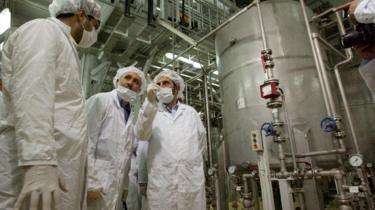 AP
AP
For President Obama, the deal that saw sanctions against Iran lifted in exchange for guarantees it would not pursue nuclear weapons was a "historic understanding".
But for Donald Trump, echoing Republican concerns, it was "the worst deal I think I've ever seen negotiated".
He had said dismantling it would be his "number one priority" but now says he doesn't want to specify what he will do.
"Who plays cards where you show everybody the hand before you play it?" he said in an interview with the Times.
Getting rid of the deal would have a huge impact on the Middle East. Iran is a key player in the Syrian conflict and a rival of Saudi Arabia and Israel, for instance.
Already Iran's Foreign Minister Javad Zarif has urged Trump to stay committed to the nuclear deal. He suggested the US would have to respect the accord given that it was thrashed out with several world powers.
Iranian Supreme Leader Ayatollah Ali Khamenei was more blunt. "If they tear it up, we will burn it," The Associated Press quoted him as saying.
Relations to the countries did not get off to a good start after the Trump presidency began - the US placed new sanctions on Iran after it conducted a ballistic missile test.
"Iran is playing with fire," President Trump tweeted.
Comments
Post a Comment